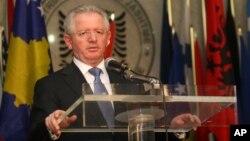Several hundred young people from the western Balkans have engaged in foreign fighter activity in Syria, a phenomenon of great concern for government and societies there.
But becoming a foreign fighter is not only a Balkan or Albanian phenomenon; it is a problem that even prosperous Western European counties face, Skender Hyseni, Kosovo's minister of internal affairs, said in an interview with VOA’s Albanian service.
Even young people from counties like Belgium and Germany join Islamic State, Hyseni said, adding that they leave to join IS even though they have jobs that pay well. That shows, he said, that economic conditions aren't young people's only motivation for becoming foreign fighters.
“Unemployment and social and economic reasons are there, but not the only reasons, and not even the predominant reason for the people to join ISIS," Hyseni said. "There are other reasons as well: ideology, indoctrination, attraction to adventurism, attraction to easy life. We hear stories of ISIS shelters turned into all sorts of drug El Dorados, sex slavery, [which] may be very attractive to numerous young people around the world. It is not solely economic and social conditions.”
Hyseni said Kosovo's government had developed an “excellent” strategy to prevent youths from joining foreign fighters, through various instruments.
A 'counternarrative'
“The strategy is mainly focused on prevention of radicalization through various steps, various campaigns of raising awareness against radicalization, getting across the message against radicalization in favor of continued interethnic, intercultural and interfaith tolerance and understanding," he said. It amounts to presenting "a countermessage against ISIS, against radicalization — a counternarrative.”
The strategy will be executed through an action plan, Hyseni said, implementable in all layers of the society and by various societal groups, including government, religious communities, civil society and others, in addition to measures taken by law enforcement entities in conformity with Kosovo law that prohibit joining foreign wars.
The so-called municipal councils for community safety will be involved in campaigning against radicalization to various communities and neighborhoods, in schools, mosques and churches, Hyseni said.
According to the data obtained by Kosovo’s Ministry of Internal Affairs, about 320 Kosovo Albanians have joined Islamic State and about 60 have died in Syria.







